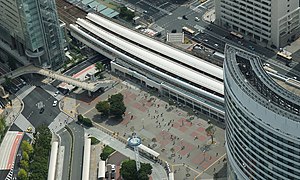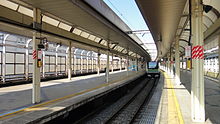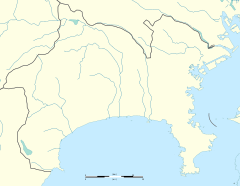Sakuragichō Station
JK11 B18 Sakuragichō Station | |||||||||||||||||||||||||||||
|---|---|---|---|---|---|---|---|---|---|---|---|---|---|---|---|---|---|---|---|---|---|---|---|---|---|---|---|---|---|
 Sakuragichō Station as seen from the top of the Landmark Tower, August 2014 | |||||||||||||||||||||||||||||
| General information | |||||||||||||||||||||||||||||
| Location | 1 Sakuragichō, Naka-ku, Yokohama-shi, Kanagawa-ken 231-0062 Japan | ||||||||||||||||||||||||||||
| Coordinates | 35°27′03″N 139°37′52″E / 35.45083°N 139.63111°E | ||||||||||||||||||||||||||||
| Operated by | |||||||||||||||||||||||||||||
| Line(s) | |||||||||||||||||||||||||||||
| Connections | Bus terminal | ||||||||||||||||||||||||||||
| Other information | |||||||||||||||||||||||||||||
| Status | Staffed (Midori no Madoguchi) | ||||||||||||||||||||||||||||
| Station code | JK11, B18 | ||||||||||||||||||||||||||||
| Website | Official website | ||||||||||||||||||||||||||||
| History | |||||||||||||||||||||||||||||
| Opened | 12 June 1872 | ||||||||||||||||||||||||||||
| Previous names | Yokohama (until 1915) | ||||||||||||||||||||||||||||
| Passengers | |||||||||||||||||||||||||||||
| FY2019 | 70,797 (JR) 19,767 (Blue Line) daily | ||||||||||||||||||||||||||||
| Services | |||||||||||||||||||||||||||||
| |||||||||||||||||||||||||||||
| |||||||||||||||||||||||||||||
Sakuragichō Station (
Lines
[edit]Sakuragichō Station is served by the Negishi Line from Yokohama to Ōfuna in Kanagawa Prefecture. with through services inter-running to and from the Keihin-Tōhoku Line and also the Yokohama Line. It is 2.0 kilometers from the terminus of the Negishi line at Yokohama, and 61.1 kilometers from the northern terminus of the Keihin-Tōhoku Line at Ōmiya. It is also served by the underground Yokohama Subway Blue Line, and is 20.4 km from the terminus of the Blue Line at Shōnandai.
Station layout
[edit]JR East
[edit]
The JR East station consists of two elevated island platforms serving three tracks.
| 1 | JK Negishi Line | for Isogo and Ōfuna |
| 2 | JK Negishi Line | (Terminating services, alighting only) |
| 3-4 | JK Negishi Line | for Yokohama JK Keihin-Tohoku Line for Kawasaki, Tokyo, and Ōmiya |
| JH Yokohama Line | for Shin-Yokohama, Nagatsuta, Machida, Hashimoto, and Hachiōji |
The station has two sets of ticket barriers ("North" and "South" gates), with entrances on the east and west sides (four in total). The station has a "Midori no Madoguchi" staffed ticket office, next to the South gate.
-
The north-east entrance, August 2014
-
The north-west entrance, August 2014
-
The south-west entrance, August 2014
-
The south-east entrance, August 2014
-
The north gate ticket barriers, August 2014
-
The view looking south from the end of platform 1/2 with the terminating middle track on the right, January 2015
-
Platforms 1 and 2
-
Platforms 3 and 4
Yokohama Municipal Subway
[edit]The Yokohama Municipal Subway (Blue Line) platforms are located on the 4th basement level, south of the main station.
| 1 | ■ Blue Line | for Kannai, Kamiōoka, Totsuka, and Shōnandai |
| 2 | ■ Blue Line | for Yokohama, Shin-Yokohama, and Azamino |
-
Platform
This transit is a ropeway,[1] but it is a new type transportation in urban area. The ropeway connects Sakuragichō Station with Unga Park where is located near Yokohama Red Brick Warehouse and Yokohama Cosmo World at 1000 yen from 22 April 2021.[2] Senyo Kōgyō constructed the similar ropeway when Yokohama Exotic Showcase '89 was held in 1989.
-
Yokohama Air Cabin Sakuragichō Station, 21 April 2021
-
Yokohama Air Cabin Sakuragichō Station (21 April 2021)
-
Yokohama Air Cabin above the road
History
[edit]Sakuragichō is one of Japan's oldest stations. It opened on 12 June 1872, as the original Yokohama Station when the service between Shinagawa and Yokohama provisionally started. The station was renamed Sakuragichō Station on 15 August 1915, when the then-new and second Yokohama Station opened near Takashimachō Station. Yokohama Station was relocated again after the 1923 Great Kantō earthquake, to its third and current location.[citation needed]
Between 31 March 1932, and 30 January 2004, Sakuragichō Station was the terminus of the Tokyu Tōyoko Line.
The north gate ticket barriers were opened on 1 July 2014, with the passageway linking the east and west sides opened to the public on 16 July.[3] A new commercial and shopping complex, called "Cial", adjoining the north side of the station was also opened at the same time.[3]
-
Yokohama Station in 1872
-
Sakuragicho Station circa 1930
-
The former Tokyu Toyoko Line platforms in January 2004
-
The east side of the station in 2007 before the addition of the north entrance
Accidents
[edit]On 24 April 1951, a 63 series Keihin Line (now part of the Negishi Line) train approaching the station caught fire when the train hit a loose overhead wire and caused a short circuit. The fire killed 106 and injured 92.[4]
Passenger statistics
[edit]In fiscal 2019, the station was used by an average of 70,797 passengers daily (boarding passengers only).[5] During the same period, the Yokohama Municipal Subway by an average of 19,767 passengers daily, (boarding passengers only).[6]
The daily average passenger figures (boarding passengers only) for previous years are as shown below.
| Fiscal year | JR East | Blue Line | |
|---|---|---|---|
| 2005 | 65,627 | 14,769 | [7] |
| 2010 | 61,536 | 15,483 | [8] |
| 2015 | 68,546 | 18,566 | [9] |
Surrounding area
[edit]The station is located near the Minato Mirai 21 district and Yokohama Landmark Tower. Other stations in the vicinity include Minatomirai Station on the Minatomirai Line.
-
Sakuragicho Station with Yokohama Landmark Tower in the background, April 2007
-
The west side of the station, August 2014
-
The TOC Minato Mirai building adjoining the station, February 2012
See also
[edit]References
[edit]- ^ Senyo Kōgyō Homepage
- ^ Press on a ropeway line will be opening
- ^ a b JR
桜木町 駅 7月 に商業 施設 CIAL開業 先立 ち北 改札 も開設 [JR Sakuragicho Station: Cial commercial facility to open in July, with north gate opening earlier]. Kanaloco (in Japanese). Kanagawa Shimbun. 27 May 2014. Retrieved 22 September 2014. - ^ Saito, Masao. "Japanese Railway Safety and the Technology of the Day". Japan Railway & Transport Review (33): 4–13. Retrieved August 3, 2008.
- ^
各駅 の乗車 人員 (2019年度 ) [Station passenger figures (Fiscal 2019)] (in Japanese). Japan: East Japan Railway Company. 2020. Retrieved 11 August 2020. - ^
横浜 市 統計 書 第 9章 道路 、運輸 及 び通信 [Yokohama City Statistics Chapter 9 Roads, Transportation and Communications (Fiscal 2019)] (in Japanese). Japan: Yokohama City. 2020. Retrieved 6 March 2020. - ^
神奈川 県 県勢 要覧 (平成 18年度 ) [Kanagawa Prefecture official statistics (fiscal 2005)] (PDF) (in Japanese). Japan: Kanagawa Metropolitan Government. Retrieved 26 March 2021. - ^
神奈川 県 県勢 要覧 (平成 23年度 ) [Kanagawa Prefecture official statistics (fiscal 2010)] (PDF) (in Japanese). Japan: Kanagawa Prefecture. Retrieved 26 March 2021. - ^
神奈川 県 県勢 要覧 (平成 28年度 [Kanagawa Prefecture official statistics (fiscal 2010)] (PDF) (in Japanese). Japan: Kanagawa Prefecture. Retrieved 26 March 2021.
External links
[edit]![]() Media related to Sakuragichō Station at Wikimedia Commons
Media related to Sakuragichō Station at Wikimedia Commons






















